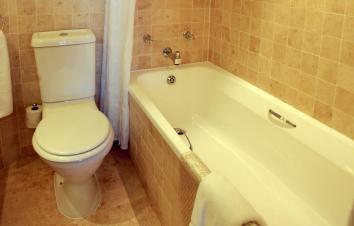If the results from a new survey conducted by Intel are any indication, the future of health care is going to be weird. Of 18,000 adults polled across eight countries, 70 percent were “receptive” to the use of next-gen health devices. These include prescription pill bottles with sensors that report missed doses, ingestible health monitors that collect ongoing data about your insides, and even toilets equipped with sensors that report back to your doctor. Moreover, 80 percent had no problem sharing such information anonymously if doing so might contribute to lower health care costs.
Obviously, these are the results of just a single survey, but the numbers are rather surprising. In a world in which the erosion of privacy makes headlines each day, a whopping majority of folks apparently wouldn’t have a problem with Big Brother picking through their excrement. Smart toilets and wearable/swallow-able health tech won’t be the first technological conveniences to put our privacy at risk, of course. Last year the CIA basically admitted it would be able to track persons of interest through smart refrigerators and other networked household appliances.
Honestly, who cares anymore? We willingly download apps that offer up our information, and 98 percent of us don’t even bother to read the privacy policy. If a robot toilet thinks it can improve my well-being and lower my hospital bills, I say what the health care—bring it on.
But privacy isn’t the only interesting issue raised by Intel’s survey. There’s also the question of what the future of the health industry even looks like. More than one-half of the study’s participants believed traditional hospitals would become obsolete in the future, perhaps because 53 percent said “they would trust a test they personally administered as much or more than if performed by a doctor.” (Italics and disbelief mine.) About one-third of those polled felt they could pull off their own ultrasounds.
Start looking for a new job, ultrasound technicians. We got this.
These findings, whether optimistic or misguided, show a growing expectation that doctors will one day soon be making house calls again via virtual technologies. Nearly three-quarters of the participants were open to meeting with their doctor remotely, an option that could save everyone time and money, as well as potentially providing a superior patient experience.
Naturally, there are many situations in which a real-life doctor will be preferable to an intelligent toilet or a talking head on a screen, and Intel’s survey hints at one of those sticking points. The survey identified a robot performing surgery as “the innovation least likely to be incorporated by the global population.” Perhaps that’s fair, as robot-assisted surgeries have recently come under fire for not accurately portraying the risks involved.
So, who do you think will have more malpractice lawsuits filed against them in the future—the robots or the DIY-patients?
(Hat-tip: Christopher Mims at Quartz)
